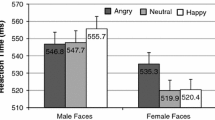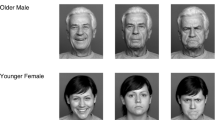Abstract
The purpose of the study was to investigate the influence of sex of stimulus person, sex type of subject, and sex of subject on the social perception of anger expression. One hundred and sixty-six female and 100 male subjects completed a questionnaire that consisted of 10 vignettes depicting the expression of anger by either a female or a male stimulus person. For each vignette, subjects rated the psychological balance, expected frequency of behavior, perceived degree of anger, and appropriateness of behavior. Overall, female stimulus persons were rated higher on all dependent measures, but only male raters significantly differentiated between male and female stimulus persons. Generally, female subjects gave higher ratings, but viewed angry behavior as less appropriate than did male subjects. Ratings were also found to be related to subjects' scores on Extended Personal Attributes Questionnaire scales that involved socially undesirable traits. Post hoc analysis indicated that the type of anger response (“aggressive” or “nonaggressive”) was also an important variable, especially for the female subjects.
Similar content being viewed by others
References
Ashmore, R. D., & Del Boca, F. K. Sex stereotypes and implicit personality theory: Toward a cognitive-social psychological conceptualization. Sex Roles 1979, 5 219–248.
Bakan, D. The duality of human existence. Chicago: Rand McNally, 1966.
Bernardez-Bonesatti, T. Women and anger: Conflicts with aggression in contemporary women. Journal of the American Medical Women's Association 1978, 33 215–219.
Birnbaum, D. W., Nosanchuk, T. A., & Croll, W. L. Children's stereotypes about sex differences in emotionality. Sex Roles 1980, 6 435–443.
Broverman, I. K., Vogel, S. R., Broverman, D. M., Clarkson, F. E. Rosenkrantz, P. A. Sex-role stereotypes: A current appraisal. Journal of Social Issues 1972, 28 59–78.
Coie, J. D., Pennington, B. F., & Buckley, H. H. Effects of situational stress and sex roles on the attribution of psychological disorder. Journal of Consulting and Clinical psychology 1974, 42 559–568.
Eagly, A. H. Sex differences in social behavior: A social role interpretation. Hillsdale, NJ: Lawrence Erlbaum Association, 1987.
Egerton, M. (1988). Passionate women and passionate men: Sex differences in accounting for angry and weeping episodes. British Journal of Social Psychology 1988, 27 51–66.
Feinblatt, J. A., & Gold, A. R. (1976). Sex roles and the psychiatric referral process. Sex Roles 1976, 2 109–122.
Johnson, M. Influence of counselor gender on reactivity to clients. Journal of Counseling Psychology 1978, 25 359–365.
Lapp, J. E., & Pihl, R. O. Sex typing and the perception of disturbance. International Journal of Women's Studies 1985, 8 149–157.
Macaulay, J. Adding gender to aggression research: Incremental or revolutionary change? In V. E. O'Leary, R. Kesler Unger, & B. Strudler Wallstron (Eds.), Women, gender, and social psychology Hillsdale, NJ: Lawrence Erlbaum Associates, 1985.
Malchon, M. J., & Penner, L. A. The effects of sex role and sex role identity on the attribution of maladjustment. Sex Roles 1981, 7 363–378.
Page, S. On gender roles and perception of maladjustment. Canadian Psychology 1987, 28 53–59.
Shields, S. The dilemma of emotion. In P. Shaver, & C. Hendrick (Eds.), Sex and gender. Newbury Park, CA: Sage, 1987.
Spence, J. T., Helmreich, R., & Holahan, C. K. (1974). Negative and positive components of psychological masculinity and femininity and their relationships to self-reports of neurotic and acting-out behaviors. Journal of Personality and Social Psychology, 37 1673–1682.
Stearns, B. C., Penner, L. A., & Kimmel, E. Sexism among psychotherapists: A case not yet proven. Journal of Consulting and Clinical Psychology 1980, 48 548–550.
Stoppard, J. M., & Kalin, R. Can gender stereotypes and sex role conceptions be distinguished? British Journal of Social and Clinical Psychology 1978, 17 211–217.
Author information
Authors and Affiliations
Additional information
The authors wish to thank N. Custeau, K. Kruger, V. Levan, J. Maxwell, and K. Zagrodney for their committed involvement to this study. We also thank D. Palmer for his helpful advice on statistical analysis and B. Robertson for his help with printing.
Rights and permissions
About this article
Cite this article
Smith, K.C., Ulch, S.E., Cameron, J.E. et al. Gender-related effects in the perception of anger expression. Sex Roles 20, 487–499 (1989). https://doi.org/10.1007/BF00288197
Issue Date:
DOI: https://doi.org/10.1007/BF00288197




